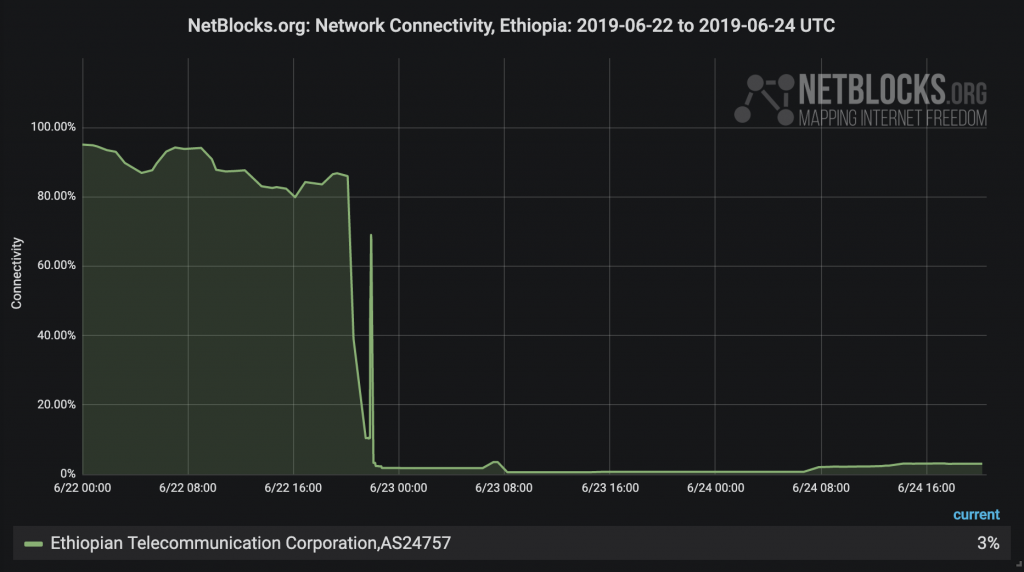Ethiopia has been cut off from the internet for over 48 hours following a blackout which started Saturday evening amid reports of an attempted plot to unseat Amhara Regional State Government.
Update: The disconnection continues at 100 hours; see below.
Real-time network data from the NetBlocks internet observatory show that over 97% of Ethiopia remain disconnected as of 8:30 p.m. UTC Monday evening.
Update: #Ethiopia has now been disconnected for 100 hours following the reported coup attempt in #Amhara state; nationwide connectivity remains at just 8% of ordinary levels according to real-time network data; incident ongoing #KeepItOn ?https://t.co/XoWtAhXFSM pic.twitter.com/gFZXYp70Oa
— NetBlocks (@netblocks) June 27, 2019
The disruption has made it difficult for journalists and observers to assess the situation on the ground. Through Monday, news media appeared to rely on official press statements with limited access to independent sources.
Instances of gunfire reported by the U.S. Embassy and other sources in Addis Ababa raised concerns over the possibility of wider conflict although the alleged attackers were reported killed by Monday afternoon as a day of national mourning was declared.
Shortly after the attack on Saturday, the Prime Minister’s secretariat appeared live on Ethiopian Television to explain, “armed men tried to unseat the Amhara Regional State Government by force but their attempt has been foiled.” It later emerged that prominent government figures had been shot dead.
What regions of Ethiopia are offline?
Network connectivity levels generally correlate to internet availability in a given country. Current real-time diffscan data, which map the IP space of a country, show that between 2% and 3% of Ethiopia’s networks remain reachable. Hence, the outage affects the entire country save for a few addresses.
NetBlocks researchers have attempted to geolocate some of the few remaining connections, finding that they may belong to technical staff or officials in the capital, as well as touristic locations such as the historic city of Axum north of Amhara state.
Some of the same internet addresses were also brought back online during last week’s series of disruptions, reportedly introduced as a measure to prevent cheating in national exams.
However, it is unclear whether the small pockets of connectivity translate to actual connectivity for ordinary internet users and the outage remains classed as a total internet shutdown.
How did the shutdown progress?
Data indicate that the outage rapidly progressed to have nationwide impact, following a brief partial disruption affecting parts of the north, including Amhara State, and some eastern regions. By the time word of the coup attempt began to spread, some 98% of Ethiopia was already offline.
Update: Internet access in #Ethiopia has been cut for over 24 hours following the coup attempt in #Amhara state; real-time network data show 99% of country currently offline; objective of blackout remains unclear ⬇️https://t.co/v2ex69GzNd pic.twitter.com/wqfWhkLwMb
— NetBlocks (@netblocks) June 23, 2019
Alert: Internet cut across #Ethiopia amid reports of coup attempt targeting #Amhara regional state government; nationwide connectivity currently now at 10% with capital and most states offline; incident ongoing #KeepItOn⚠️?https://t.co/v2ex69YbbN pic.twitter.com/pAtfI7nAPq
— NetBlocks (@netblocks) June 22, 2019
Who is responsible for Ethiopia’s internet outage?
It remains unclear which party ordered the internet shutdown in the first place, and also unclear why Ethiopia remains offline. Timings from the NetBlocks observatory suggest that the nationwide disconnection may have been imposed after the plot was uncovered in support of counter-operations to put down the insurgency.
The brief return of internet in #Ethiopia 21:55 pm. UTC (1.5 hours ago) is unusual and suggests attempts were made to get reconnected.
— NetBlocks (@netblocks) June 22, 2019
After a coup attempt governments will generally aim to re-establish state media and internet as a matter of urgency.
But that hasn't happened: pic.twitter.com/BbdMhqhu3u
In recent weeks Ethiopia has experienced a series of nationwide blackouts causing significant social and economic harm, stoking dissatisfaction with Prime Minister Abiy Ahmed. The latest information blackout comes exactly one year after his government declared freedom of expression a “foundational right” and proposed a series of pro-democracy reforms which now face unprecedented challenges.
Methodology
NetBlocks diffscans, which map the IP address space of a country in real time, show internet connectivity levels and corresponding outages. Purposeful internet outages may have a distinct network pattern used by NetBlocks to determine and attribute the root cause of an outage, a process known as attribution which follows detection and classification stages.
NetBlocks is an internet monitor working at the intersection of digital rights, cyber-security and internet governance. Independent and non-partisan, NetBlocks strives to deliver a fair and inclusive digital future for all.
[ press | contact ] Graphics and visualizations are provided for fair use in unaltered form reflecting the meaning and intent in which they were published, with clear credit and source attribution to NetBlocks. Intellectual property rights are protected including but not limited to key findings, facts and figures, trademarks, copyrights, and original reporting, are held by NetBlocks. Citation and source attribution are required at the point of use.

